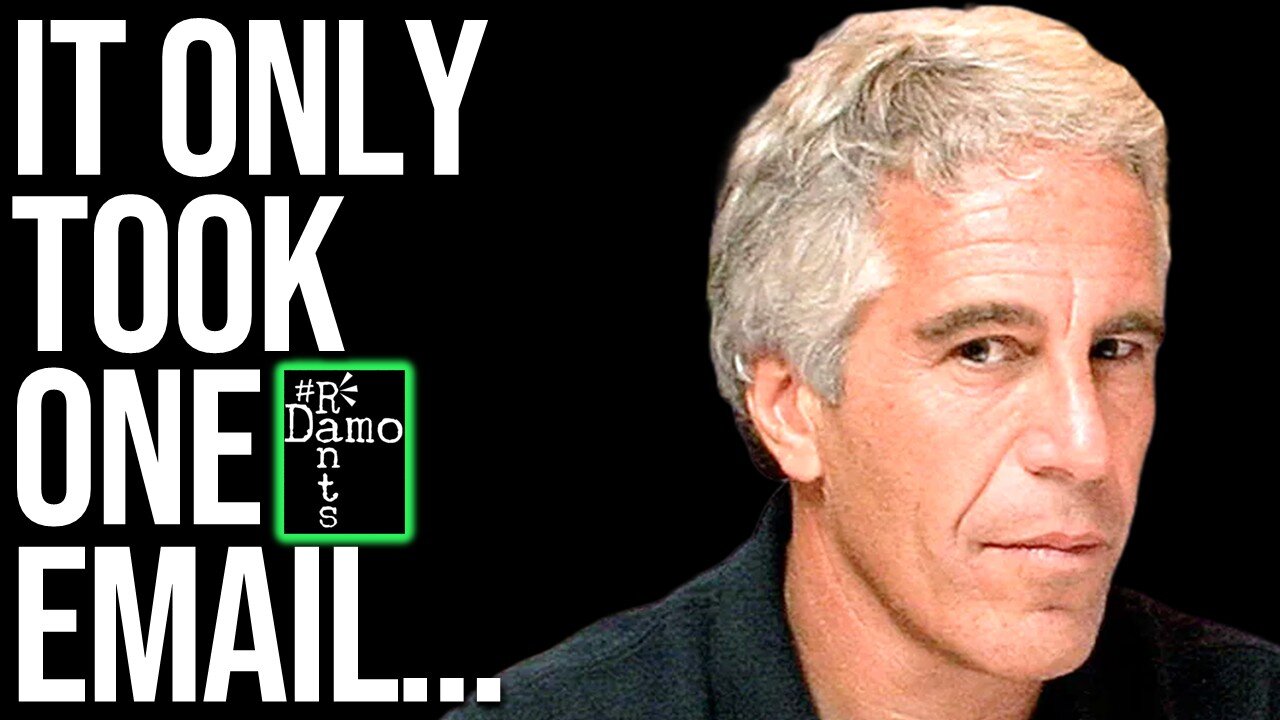Premium Only Content

Epstein Email Release Does Lebanon A MASSIVE Favour
Right, so the United States sent Tom Barrack to the Middle East with a brief to lecture Lebanon on discipline, stability, and security, and he did it with the swagger of a man who thought his own past would never catch up with him. Then the Epstein files dropped. Not rumours. Not whispers. Paperwork. A 2016 email from a convicted predator telling Barrack to send “photos of you and child — make me smile.” The same Barrack who called Lebanon a failure. The same Barrack who warned it of war. The same Barrack who is trying to force Hezbollah into disarmament, all for the sake of Israel. The email inbox did what diplomacy never seems to anymore. It told the truth. And once you’ve seen the envoy who tried to police a whole country sitting in Epstein’s correspondence, well the pressure campaign looks exactly as rotten as Lebanon always said it was.
Right, so this story doesn’t open in Beirut or Tel Aviv or Washington. It opens in the inbox of a man who moved through the American elite without ever being pushed back. A man whose name hung over the political class like a rotten beam. A man who wrote in 2016 to Tom Barrack and asked him to send photos of “you and child — make me smile.” The line sits there without decoration. No explanation. No context. No defence. Just a sentence dropped into the middle of a conversation between a convicted predator and the man who would later be sent to shape the future of Lebanon in Israel’s interests.
This email of course sits inside a wider release. Thousands of pages of old communications dragged into daylight at the same time. Messages where Epstein talked about Donald Trump with the cold familiarity of someone who knew far too much. Messages where he called Trump dangerous. Messages where he spoke casually about victims spending time with him. Messages showing proximity that had been hidden behind lawyers and silence. That same release dropped Barrack into the frame as well. Two men tied into the same orbit appearing in the same packet of emails. A president who used Barrack as a fixer and an envoy. An envoy who allegedly told Epstein they should catch up. A predator who said he had been getting many calls about their friendship.
Barrack’s public life moved on from that inbox. He became a diplomat. He took a role that required stability, judgment, and credibility. He stepped into a region already bent under the pressure of American power. He spoke about Hezbollah. He spoke about peace. He spoke about Lebanon in a tone that dripped with disdain. He held the microphone as if nothing in his own history could ever touch him. He warned Lebanon that if Hezbollah did not disarm, conflict would arrive. He said the country had failed. He framed its politics as an obstacle. He reduced its sovereignty to a problem to be solved. He carried himself as the sculptor of a fate that was not his to decide.
The region heard him because envoys carry the voice of the state. His voice was treated as the voice of Washington. His warnings were treated as pressure from the United States. His demands sat inside a larger structure where Gulf actors dangled investment and the United States pushed disarmament and Israel sought strategic advantage and very much continuing to violate that farce of a ceasefire. The pressure campaign operated through a single expectation: that Barrack could speak without his credibility being in question. That his authority held because nothing in his public record pierced it. That the appearance of confidence would be enough to bend a fragile state already caught in an economic disaster.
Then the email surfaced.
The same man who told Lebanon to tidy itself up. The same man who mocked its journalists and referred to them as ‘animalistic’. The same man who said the country was broken. The same man who told its government to dismantle a major militia under threat of war, despite still being under attack. The same man who walked into Beirut carrying Washington’s weight had been quietly corresponding with Jeffrey Epstein once upon a time. And not in a vague, distant, polite way. In a way that placed him squarely inside Epstein’s orbit. In a way that put a line in front of the world that no envoy can carry without consequence. A line that blew a hole clean through the fiction of moral authority that Washington relies on when it leans on weaker states.
Barrack’s words to Lebanon came from a man who believed he could never be touched. A man who assumed his proximity to power would shield him from scrutiny. A man who thought the inbox would remain buried. He spoke as if Lebanon would never know who he had been speaking to, this it was old news, part of his past, it no longer mattered. He spoke as if the warnings he delivered would land without anyone seeing the rot in the foundation. He spoke as if the force of American power would compensate for the emptiness behind the diplomat.
Epstein’s name does not need elaboration. His history is public. His crimes are documented. The people around him spent years pretending they didn’t know what he was. They claimed distance. They claimed ignorance. They claimed innocence by silence. The email strips those claims from Barrack. The line cannot be explained away with a shrug. The line sits inside a conversation between two men who operated in the same political atmosphere. One held office. One collected the rich and powerful like trophies. One demanded obedience from Lebanon. One demanded photos from Barrack.
Lebanon did not ask for this. Lebanon did not engineer this. Lebanon did not get a sudden reprieve because the world grew a conscience, or that the rancid financier’s evidence collection continues to make news. Lebanon got something else entirely. Lebanon got a crack in the armour of the man who is trying to dictate its future. Not through diplomacy. Not through negotiation. Not through leverage of its own. Through the simple act of a release showing the truth about an American envoy that Washington had chosen to trust.
The release pulled the cloak back. Underneath it was not strength. Underneath it was a man carrying the baggage of his own decisions. A man who had appeared in Epstein’s inbox. A man who expected Lebanon to take instructions from someone who couldn’t keep his own associations clean.
Washington built its pressure campaign through him. Israel relied on him to carry a line about disarmament. Gulf partners used his presence to frame the economic pressures they wanted to apply. His authority was the hinge. The email snapped the hinge. Even if Washington pretends the door still swings, the weight is gone. An envoy without credibility is an envoy without force and how can Barrack possibly retain credibility now? How can anyone found with suspicious ties to Epstein?
Hezbollah do not plan to disarm for as long as Israel continues to attack the country. Their position was stated long before the email release. The pressure was supposed to make them bend courtesy of their own government. The pressure depended on the idea that the United States envoy could shame Lebanon into compliance. The envoy cannot shame anyone now. His moral standing is gone. His warnings fall flat because the man behind them has been stripped of the illusion he carried. When the United States sends an envoy to lecture a country on stability while carrying an email like that in his inbox, the lecture collapses on contact.
The region understands power. It understands credibility. It understands the difference between posture and substance. The moment the email surfaced, the posture evaporated. The substance had never been there. Lebanon now sees the diplomat who threatened it through the lens of the sentence he received from Epstein. A sentence that rewrites the entire context of his mission. A sentence that lands heavier than any warning he ever issued.
The Trump connection widens the collapse, because of course Barrack is on his mission at Trump’s behest. The same release exposed Trump’s closeness to Epstein once more. The same lines described by Epstein paint Trump in a brutal light. These communications came out together. The former president. The envoy he placed. The predator who sat between them. Power linked through correspondence that was never meant to be read aloud. A triangle that makes Washington look like it cannot police its own ranks while demanding discipline from others. A triangle that turns every threat issued to Lebanon into an echo of hypocrisy.
The apparatus around Barrack depends on silence. It depends on the belief that Washington’s envoys stand above the people they pressure. It depends on the illusion that American power comes clean. The inbox took that illusion apart. The inbox turned a diplomat into a liability. The inbox made clear that the United States sent a compromised figure to dictate the destiny of a country already under strain for the sake of their Zionist project. The inbox made explicit what Lebanon has been saying for decades: the people sent to reshape its politics are often the ones least fit to judge it.
The pressure campaign on Lebanon now carries a shadow it didn’t have before. The demands came from a man who cannot stand on the authority he claimed. The warnings came from a man who cannot deliver them without the stain of that email following every syllable. The United States can pretend the pressure remains intact. Israel can pretend the disarmament line still holds. The Gulf can pretend the investment leverage still carries weight. But the reality sits there in the inbox. A single line. A single exposure. A single fracture under the weight of American foreign policy.
Barrack cannot walk into Lebanon with the same posture again. He cannot speak with the confidence he once had. He cannot issue warnings without the audience seeing the ghost of that email behind his face. Who is the child that is referred to? Coming from Epstein as it did, that’s as creepy as you get. The credibility is gone. The pressure campaign is weaker because the man carrying it has lost the one thing he needed: the illusion that he was above reproach.
The collapse doesn’t arrive with noise. It doesn’t come with statements or resignations or any show of accountability. It comes in the quiet after exposure, when the diplomat who once spoke with force now stands under the weight of a line he can’t scrub out. Lebanon does not need to move a muscle to feel the shift. The weight that once pressed down on it is lighter because the hand that held it has been shown for what it is. The silence around Barrack now is louder than any public reaction. Power depends on confidence. Confidence depends on credibility. Credibility depends on the absence of doubt. The email plants doubt in every room he enters.
The pressure he applied was never subtle. It was blunt, patronising, and dismissive. He spoke about Lebanon as if its people were a problem to be corrected. He addressed its institutions as if they were beneath him. He warned of war as if it were a tool. He treated journalists as if they were an inconvenience. His entire presence rested on the idea that he came from a system with the right to judge a country that had endured more trauma than he could imagine. He misread the ground because he assumed the ground belonged to him.
The exposure flips the room. Lebanon no longer stands beneath the diplomat. The diplomat stands beneath the sentence in his inbox. His authority slips because authority cannot survive ridicule. And nothing invites ridicule like a man who delivered moral lectures while corresponding with a figure known globally for preying on the vulnerable. The contrast destroys the performance. The illusion of superiority disintegrates. The idea that he could shame Lebanon into anything becomes laughable. The Lebanese see the man now, the sort of man that appears in an Epstein email, not the seal on his letterhead.
Washington will not admit the collapse of course. Washington never does, even as the President himself is mired in the same mess. It will again attempt to absorb the embarrassment and pretend nothing happened because the alternative is acknowledgement. But the collapse does not require Washington’s admission. It exists in the political bloodstream whether Washington acknowledges it or not. It exists in the memory of every journalist Barrack insulted. Every official he patronised. Every warning he delivered. A man who threw contempt at a whole country now carries the weight of a sentence sent by Jeffrey Epstein. No amount of diplomatic formality can repair that.
The wider network around Barrack does not escape untouched. The inbox placed Trump inside the frame as well. Epstein’s commentary about him sits on the same layer of release as the Barrack request. The image that emerges is not of distant figures accidentally crossing paths but of a political world where proximity to men like Epstein was normalised. Lebanon is not looking at a single envoy compromised by a stray email. Lebanon is looking at a whole political architecture where the people sent to shape its fate were swimming in the same circles as a predator whose crimes were known for years.
This is not a conspiracy. This is paperwork. This is what the documents say. This is how the timeline reads. A predator wrote to a future diplomat in 2016. That diplomat became the man who pressed Lebanon to disarm Hezbollah in nobody’s interests except Israel’s. That same diplomat called Lebanon a failure. That same diplomat warned of war, of consequences, as if Israel weren’t already attacking, violating that ceasefire daily for almost a year now. And now that diplomat is known to have maintained contact with a man whose crimes strip him of any moral standing. The contradiction speaks for itself. No commentary needed. No flourish needed. The facts land on their own weight.
Lebanon has endured the consequences of Western interference long before Barrack arrived. It has watched foreign envoys cycle through with the same tone of arrogance, the same ignorance, the same certainty that Lebanon could be moulded like clay in their hands. Barrack followed the script. He delivered the lines. He played the part. The email rips the script up. The actor is exposed. The role loses its power. Lebanon sees the machinery behind the performance. Once you see the wires, the illusion is gone.
Hezbollah’s position does not change because of the email. It was never going to change. The pressure was never going to break it. But the exposure weakens the argument that Lebanon should listen to lectures about security delivered by an envoy whose private behaviour raises questions heavier than any accusation he levelled at them. When a man demands your disarmament while carrying that sentence in his inbox, the imbalance becomes comedic.
The Gulf’s leverage loses some of its sting as well. Investment tied to American diplomatic pressure now sits on a foundation that is visibly cracked. Barrack represented the United States in those discussions. His presence helped hold the fiction that Lebanon was the reckless one, that the region’s stability depended on its compliance. The email introduces a different story. A story where the region sees that the man sent to enforce American will could not even keep his own associations clean. A story where the region recognises the hypocrisy behind the lectures.
Israel’s reliance on Barrack as a diplomatic amplifier also takes a hit. Not through public statements but through the quiet recognition that the man whose voice they used no longer carries the same weight. Disarmament demands lose force when the person delivering them is compromised. You cannot tell a nation to sever part of its defence posture while carrying a sentence from Epstein in your background. Even Israel must see the liability. They won’t say it, but they don’t have to. The structural impact is already baked in.
Washington’s problem is not the email itself. Washington’s problem is that the email fits a pattern. Epstein had access to some of the most powerful men in America. The release confirms contact that was long suspected. It reveals a political world where lines between office, influence, and predation grew thin. Barrack is not unique in this network. But Barrack is unique in that he was the one sent to threaten Lebanon. The one sent to reshape its security architecture. The one sent to warn of conflict. That envoy now walks with the stain left in his inbox, and it’s a stain he’ll never wash off.
The question is not whether the United States will continue pressing Lebanon. It will. Power does not stop because a man is exposed. But power becomes less persuasive when the mask slips. Lebanon now knows something it did not know before. The man who tried to lecture it carried his own rot. And once the rot is visible, the pressure becomes lighter. Those who rely on intimidation cannot afford exposure. The slightest crack in the façade collapses the whole performance.
This is the crack.
You cannot send a man to dictate the fate of another nation while hoping the world forgets who he corresponded with. When the truth lands, the authority dissolves. When the authority dissolves, the pressure weakens. When the pressure weakens, Lebanon breathes a little easier. Not because the world grew kinder, but because the mask slipped at the wrong moment for the people who needed it most.
Epstein’s archive has delivered many shocks. But this one falls differently. It does not strike a celebrity or expose a rumour. It hits a diplomat at the centre of a live geopolitical pressure campaign. It hits the link between American power and Israeli priorities. It hits the credibility of the man chosen to carry both. And it hits at a moment when Lebanon has already endured too much from men like him.
Barrack will carry on. They always do. Washington will pretend nothing has changed. Israel will carry on pushing. The Gulf will keep circling. But Lebanon has seen the email. Hezbollah has seen the email. The region has seen the email. The world has seen the email. And now every word Barrack ever spoke about Lebanon sounds different.
He warned them of war. He told them to disarm. He called them failures. And all the while, a message from a predator waited in his inbox. A message he never expected to be read out loud. A message that strips his authority to the bone.
The Americans sent a compromised man to lecture a compromised country on behalf of a compromised President. Lebanon was never the one who should have been ashamed.
And for all of Barrack’s promised threats of war, as if Israel has ever stopped, Israel carrying on is now looking more and more difficult. If they want to launch this threatened war against Lebanon, which will almost certainly see Lebanon take up arms again, they are some 12,000 soldiers short and with nowhere to find them from! Get all the details of that story here.
Please do also hit like, share and subscribe if you haven’t done so already so as to ensure you don’t miss out on all new daily content as well as spreading the word and helping to support the channel at the same time which is very much appreciated, holding power to account for ordinary working class people and I will hopefully catch you on the next one. Cheers folks.
-
 2:03:57
2:03:57
Benny Johnson
2 hours agoFBI Director Kash Patel Makes January 6th Pipe Bomber Announcement: Massive Breakthrough, Stay Tuned
40K20 -
 1:06:17
1:06:17
Graham Allen
4 hours agoFAKE NEWS Is Everywhere!! Are We Living In The Upside Down?!
115K434 -
 2:59:36
2:59:36
Wendy Bell Radio
7 hours agoFeeding Their Greed
46.1K77 -
 1:55:12
1:55:12
Badlands Media
9 hours agoBadlands Daily: November 26, 2025
31.9K6 -
 1:13:11
1:13:11
Chad Prather
18 hours agoGratitude That Grows in Hard Ground: A Thanksgiving Message for the Soul
68.4K42 -
 LIVE
LIVE
LFA TV
14 hours agoLIVE & BREAKING NEWS! | WEDNESDAY 11/26/25
3,956 watching -
 1:59:03
1:59:03
The Chris Salcedo Show
15 hours ago $11.63 earnedRemembering Rush On A Truly American Holiday
30.9K2 -
 36:24
36:24
Julie Green Ministries
5 hours agoLIVE WITH JULIE
102K226 -
 1:05:27
1:05:27
Crypto Power Hour
13 hours ago $9.94 earnedWhat You Need To Know About Gold Tokenization
66.9K8 -
 1:46:14
1:46:14
LIVE WITH CHRIS'WORLD
14 hours agoTHE WAKE UP CALL - 11/26/2025 - Episode 14
30.8K2